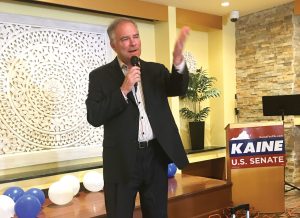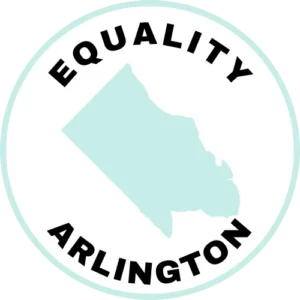
The City of Falls Church officially opened its Capital Bikeshare stations throughout the municipality on Monday, ushering in the latest step in the City’s vision to provide multi-modal transportation options to residents just in time for the Bike to Work Day taking place this Friday across the Washington, D.C. metro region.
A total of 10 stations with 12 bikes docked at each location were identified as ideal spots in the City’s bicycle master plan back in 2015. According to City planner Kerri Oddenino, a ridership analysis with Foursquare determined where Bikeshare stations are most likely to be used, which included higher density residential and commercial areas as well as linking up with pre-existing bike infrastructure and bike routes. The plan, according to Oddenino, was to distribute the stations anywhere from two to four blocks from each other in those targeted corridors. Currently, eight of the stations are located either along Washington St. or between Washington St. and Spring St.
Bikeshare’s addition to the City is intended to be permanent. The metric used to determine whether that addition is being healthily supported is if residents’ membership fees are covering 30 percent of the operating cost that’s taken on by third party contractor, Motivate International, Inc, according to City planning director Paul Stoddard. For a frame of reference, the 30 percent user fee recovery expected from City residents is significantly lower than the thresholds other major jurisdictions agreed to, such as D.C.’s 100 percent coverage and Arlington County’s, which wasn’t specified by Stoddard or Oddenino but was indicated to be a bit lower than the District’s.
“We’ve set this up for success,” Stoddard said. “One of the things we wanted to make sure to do was to limit any general fund expenditures that would ever have to go to this.”
If the City misses its user fee recovery mark, supplementary funds will be tapped into from either the Transform I-66 project, developer contributions and eventually advertising revenue generated at the stations, per Stoddard.
The Transform I-66 project aims to reduce congestion on the interstate by getting commuters to use public transit, with, as Stoddard noted, the Bikeshare bikes providing an alternative option to travel to public transit.
The in-development Founders Row project is funding the use of Bikeshare stations for the life of the project and Stoddard said the City is seeking similar commitments from future developers as well. Once residents become acquainted with the Bikeshare locations, the panels displaying a map of the City’s stations can be rotated out for advertisements, according to Stoddard, creating more reserve funding.
Oddenino mentions that an advantage the City has is it’s set up well for people who want to take short trips to certain stores or residences. City resident Russell Hughes agrees that more transportation options are a positive, and specifically commented on having the ability to turn the 20-minute walk to the East Falls Church metro station into a short bike ride as a definite plus.
On the flip side, a challenge the City has to cope with is a lack of infrastructure to accommodate the new bikes. Stoddard acknowledged that Washington St. is not an ideal location to bike, but on the quieter side streets he believes residents will adjust in due time. He also added that whenever there’s an opportunity to install new infrastructure for bikes, the City has done so. Two examples he cited were the bike facilities added to South West Street a few years ago when it was reconstructed and the bike lanes added to Hillwood Avenue when it was re-striped.
City resident Doug Greene, who addresses his general concerns about biking behavior in the City in a “Letter to the Editor” in this edition, lent his views about the Bikeshare stations to the News-Press.
Tactically, he felt in the dark on the planning and unveiling process of the stations. On a strategic level, he believes the decision to remove parking spaces, especially on Park Ave., came across as thrown together given the pedestrian, parking, car, bike and development congestion the street is already experiencing. Particularly, as he suggests in his letter, he believes law enforcement needs to tackle the visible minority of negligent bikers, similar to how police have made speeding a punishable faux pas on Broad St.
When discussing the parking spaces that were removed to accommodate the Bikeshare stations, Oddenino characterized it as the City was removing two parking spaces to make room for 12 bike spaces. Stoddard chimed in to say he expects there to be some disagreement about how the City is going about using the space, but assured that the Bikeshare stations are about adding more choices for residents to get around.
Stoddard added that the City has been somewhat of a trend setter in the western portion of Northern Virginia with its use of Bikeshare stations. Originally only D.C., Arlington and Alexandria City were Bikeshare operators, but the City has moved the trend westward with the City of Fairfax and the town of Vienna now exploring how to get Bikeshare stations in its municipalities.
The City looks to contribute to the roughly 20,000 commuters who will be participating in the Bike to Work Day event taking place tomorrow from 6:30 a.m. – 9 a.m. The City’s designated pit stop will be located at the Washington & Old Dominion trail crossing at Little Falls St.












